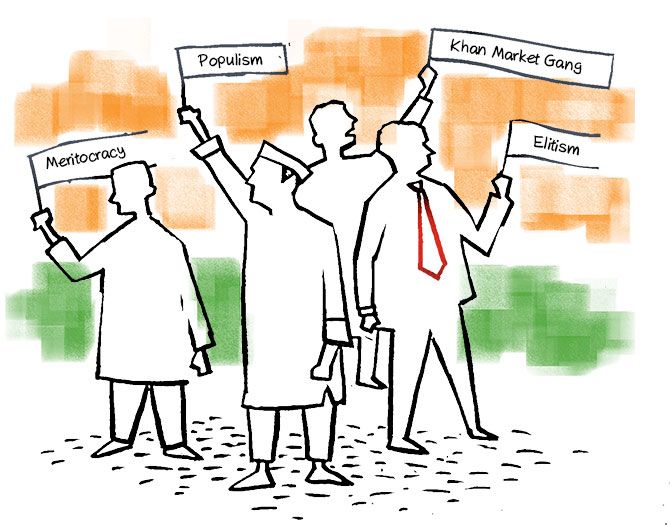 | « Back to article | Print this article |
Ajit Balakrishnan decodes the angst-ridden discourse of the day.
Illustration: Dominic Xavier/Rediff.com

Not a day passes without encountering some serious thinker venting his/her angst on this subject.
It could be an editorial or a column in a newspaper, magazine or Web site, or an interpersonal exchange at work or a comment by a friend one is having a drink with.
Let's quickly run over the vocabulary of this angst-ridden discourse.
The list is long.
One does not have to be a scholar to deduce that all these terms are used pejoratively -- if you refer to someone as a Khan Market gang member, you see yourself as being different from that person and, similarly, if you refer to someone as a member of the elite, you see yourself as not being a member of that elite.
Or, is it possible that the time has come for us to introspect whether our society, even a half-century after Independence, reserves the top spots in politics, administration and the corporate world to sons and daughters of families who have always occupied such positions?
And that early life in elite English medium schools (Campion in Mumbai, DPS in Delhi...) and colleges (St Xavier's in Bombay, St Stephen's in Delhi...) in metro cities puts you in the fast lane to such top spots in life?
Conversely, if you are born in and grew up in a village and attended the local non-English medium school, your chances of making it in life in India are bleak?
If this kind of name-calling was just in India and that too in an election year, we could have easily turned our mind to other things by saying that people don't always mean all that they say during a heated election and once the season changes, sanity and a co-operative culture will return.
After all, caring for the world at large and that too for people who are less economically well-off from you is, well, large-heartedness, and need not be pejoratively called populism.
And if you see someone hang out all the time in expensive eateries, you only smile indulgently and tell yourself he is one of the idle rich, not really a member of 'the elite'.
Observers trying to understand the reasons for Donald Trump's victory in the 2016 US presidential election point out that his vote came mainly from working-class white people, both men and women, particularly ones without college education, living in rural America, and their reason for voting for him was that they felt overlooked by 'the establishment' and 'the elite'.
In Britain, the surprising majority vote in the 2016 referendum wanting Britain to leave the European Union is widely seen to be also a vote against the British elite; voters expressed the view that British politicians, business leaders, and intellectuals had lost their right to control the system and that this elite had contempt for ordinary persons values and their interests.
And political leaders riding on anti-elitist platforms now lead governments in Italy, Hungary, Poland, Slovenia and the Czech Republic.
Some observers see this wave of anti-elitism/pro-populism as a pushback against the ideology of globalisation that has reigned since the end of World War II, and which has created institutions like the International Monetary Fund and the World Trade Organisation.
The current anti-elitist movements believe that such institutions undermine local decision-making by empowering large corporations that use these institutions to support their own corporate and financial interests to do business across borders, extract natural resources while paying minimal local taxes and so on.
In the Indian context, getting a job in one of the entities created by this globalisation mantra has meant meeting its standards of meritocracy, which means entrance tests (CAT, JEE Advanced, GRE... etc) that we believe ensure that young people, irrespective of their social and economic background, get an equal chance to enter our top educational institutions -- whether the IIMs, the IITs, the national law schools or the public medical colleges.
We have fervently believed that such entrance processes and such public institutions would ensure that entry to the major professions of our times would be available to children from all kinds of social and economic backgrounds and not just for children whose parents are from elite backgrounds.
But, increasingly, researchers are pointing out that scores in these apparently objective exams reflect the socio-economic status of the parents -- both because educated and affluent parents not only ensure good quality schooling but also pay for the expensive tutorial classes that seem to have become essential to do well in such exams.
Add to this that most entrance processes -- whether for one of these prized national educational institutions or for a job -- have an interview/group discussion which requires a degree of fluency in English that disadvantages all those who haven’t had an English-medium school education.
In this context, could it be that what looks like a populist wave is really a vote to change a system which, in the name of meritocracy, is essentially fixed to benefit a narrow minority?
Ajit Balakrishnan, founder and CEO, Rediff.com, is the author of The Wave Rider, A Chronicle of the Information Age. You can reach him at ajitb@rediffmail.com